Open your heart to the Bible's timeless tales, each promising a unique lesson to transform your spiritual journey—discover your favorite.

Favorite Stories in the Bible
From the creation of the world to the parting of the Red Sea, the Bible is filled with stories of faith, courage, and wisdom. You've likely found yourself inspired by Noah's perseverance, challenged by Moses' leadership, or comforted by the tale of the Prodigal Son. Each story carries its own unique lessons and insights, serving as a guide through life's myriad challenges and joys.
But have you ever stopped to consider which narrative resonates with you the most? Let's explore together, and perhaps you'll discover a new perspective on an old favorite that speaks to your journey.
Key Takeaways
- The Creation story explores the complexity of human nature and divine relationships.
- Noah's Ark emphasizes faith, obedience, and the importance of conservation ethics.
- Moses' journey in Exodus highlights themes of liberation, faith, and divine calling.
- The tale of David and Goliath challenges conventional wisdom through faith and courage.
The Creation Story
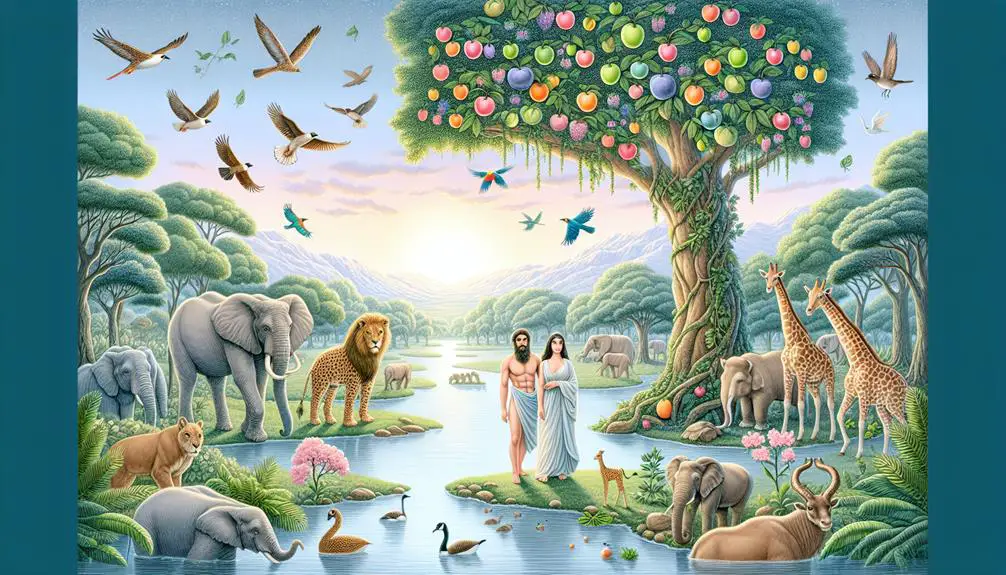
The Creation Story, as depicted in Genesis, serves as the foundational narrative for understanding humanity's origins and relationship with the divine, illustrating a meticulously ordered process through which the world and all its inhabitants came into being. This narrative isn't just a chronological account but layers moral and theological implications, especially when you delve into the episode of the Garden temptation. The Serpent's deceit introduces a pivotal moment in human history, marking the inception of moral consciousness and the complex human-divine rapport.
Analyzing the Garden temptation, you're confronted with the profound theme of free will versus obedience. The Serpent's deceit doesn't merely lie in the act of tempting Eve but in the distortion of truth that questions divine authority and intentions. This episode is critical in understanding the human condition, showcasing the inherent tension between curiosity and compliance, freedom and restriction.
Moreover, this narrative segment underscores the fragility of human integrity in the face of cunning persuasion, setting a precedent for the recurring theme of temptation throughout biblical stories. It reflects on the consequences of actions, emphasizing the weight of choices and their repercussions on humanity's relationship with the divine.
Noah's Ark
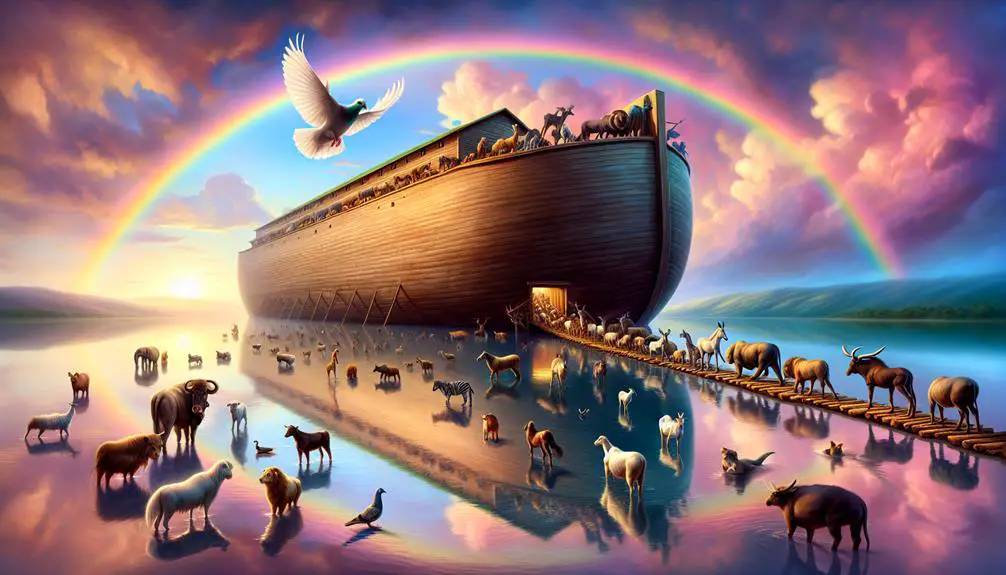
You'll find that the narrative of Noah's Ark, beyond its surface-level recount of survival and obedience, embeds intricate details about the ark's construction and the logistical challenge of gathering animal pairs.
These elements not only underscore the story's theological dimensions but also its literary depth, inviting a closer examination of how divine instructions translate into human action and animal cohabitation.
Such an analysis reveals the multifaceted layers of this biblical account, enriching your understanding of its significance and complexity.
Ark's Construction Details
In examining the construction details of Noah's Ark, one must consider the precise instructions given in ancient texts, specifying dimensions, materials, and structural layout. These directives not only highlight advanced woodworking techniques but also underscore flood survival strategies integral to the Ark's design.
- Dimensions: The Ark's measurements were monumental, ensuring stability and buoyancy during the deluge.
- Materials: Gopher wood, a term that has puzzled scholars, was specified, indicating materials chosen for durability and water resistance.
- Structural Layout: The Ark featured multiple levels, optimizing space for its occupants and provisions.
- Waterproofing: Pitch was applied inside and out, a critical component in preventing water ingress and ensuring the vessel's integrity throughout the flood.
Animal Pair Collection
Having explored the intricacies of Noah's Ark's construction, let's now examine the logistical feat of gathering animal pairs, a task that tested the limits of ancient organizational strategies. This endeavor wasn't just about survival; it delved deep into animal symbolism and conservation ethics, marking a pivotal moment in humanity's relationship with nature.
Animal Type |
Symbolism |
Conservation Ethic |
|---|---|---|
Birds |
Hope, freedom |
Biodiversity preservation |
Mammals |
Strength, unity |
Genetic diversity |
Reptiles |
Adaptation, life |
Habitat conservation |
Amphibians |
Transformation |
Ecosystem balance |
Insects |
Resilience |
Ecological importance |
These pairs weren't randomly chosen. Each species carried profound symbolic meanings, emphasizing the story's depth and the ancient understanding of ecological balance. This collection process underscores a nascent awareness of conservation ethics, highlighting the interdependence of life on Earth.
Exodus: Moses' Journey
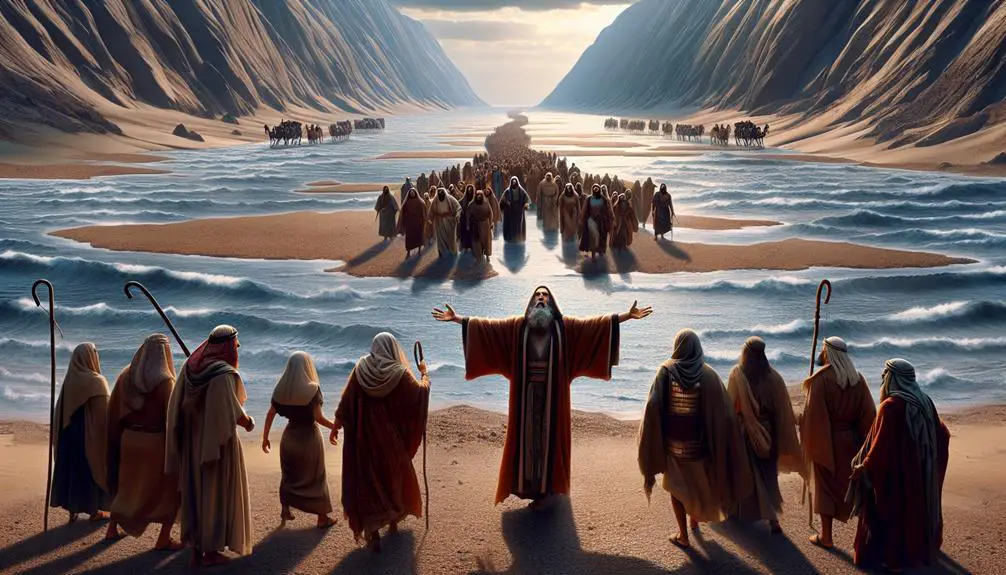
Embarking on a transformative journey, Moses leads the Israelites out of Egyptian bondage, an event that not only defines his legacy but also marks a pivotal moment in biblical history. The narrative of Moses is rich with themes of liberation, faith, and divine intervention, compelling you to delve deeper into its layers.
Let's explore key aspects of Moses' journey:
- The Burning Bush Encounter: This pivotal moment symbolizes divine calling and initiation. Here, Moses receives his mission from God – a testament to the profound interplay between divine will and human agency.
- Plagues of Egypt: A dramatic demonstration of power and a challenge to the Pharaoh's tyranny, these plagues underscore the struggle between oppression and liberation, highlighting the lengths to which divine justice will go to free the oppressed.
- Passover: Instituted as a perpetual observance, Passover commemorates the Israelites' deliverance, symbolizing hope and renewal amidst despair.
- Parting of the Red Sea: Perhaps the most dramatic event, this miracle serves as the ultimate testament to God's power and protection, securing the Israelites' escape from persecution.
Through these events, Moses' journey invites you to reflect on themes of faith, freedom, and divine providence, offering profound insights into the human condition.
David and Goliath

You'll find that Goliath's formidable presence not only serves as the literal giant in the story but also symbolizes the overwhelming obstacles we face in life.
David's unwavering faith, in contrast, isn't merely a personal conviction but a reflection of the power of belief in overcoming the insurmountable.
The battle's unexpected outcome, subsequently, challenges conventional wisdom about strength, victory, and the dynamics of power.
Goliath's Formidable Presence
Goliath's towering figure, standing over nine feet tall, immediately set the stage for an unequal confrontation in the biblical story of David and Goliath. His formidable presence wasn't just due to his height; it was accentuated by:
- Goliath's Armor: A sophisticated array of protective gear that symbolized not only his physical strength but also the Philistine army's military prowess. The detailed description of his armor in the text underscores its significance.
- His Spear: Described as heavy and formidable, symbolizing the might of the Philistine forces.
- His Shield Bearer: Indicating the level of preparation and support that Goliath had, showcasing the Philistine army's tactical approach.
- His Challenge: His audacious challenge to the Israelites reflects his confidence and the psychological warfare employed by the Philistines.
These elements collectively highlight Goliath's role as a daunting adversary within this narrative.
David's Unwavering Faith
In stark contrast to Goliath's formidable presence, David's unwavering faith in his ability to overcome such a daunting adversary stems not from physical prowess but from a profound belief in divine support.
Goliath's background as a seasoned warrior, towering in both stature and reputation, set the stage for what appeared to be an unequal confrontation. Yet, it's David's shepherd life, marked by solitude, reflection, and encounters with the natural world, that nurtured his deep faith. This shepherd life, devoid of conventional warfare training, ironically equipped David with the resilience and trust in divine providence necessary to face Goliath.
Analyzing this dynamic, it becomes evident that David's spiritual fortitude, cultivated in pastoral settings, was the cornerstone of his confidence, not mere optimism or naivety.
Battle's Unexpected Outcome
The battle between David and Goliath, often depicted as a mere underdog story, fundamentally challenges our understanding of power and divine intervention in historical narratives. This event isn't isolated; it's part of a biblical theme where the impossible becomes possible.
Consider these points:
- Divine Strategy: David's reliance on God parallels Gideon's army, both showcasing faith over might.
- Moral Courage: David's bravery echoes the faith-driven actions that brought down Jericho's walls.
- Unexpected Victory: Neither conventional weapons nor numbers guaranteed success; faith and divine will did.
- Symbolic Defeat: Goliath's fall represents the triumph of divine power over earthly strength, a recurring biblical motif.
This analysis underscores a deeper truth: in biblical narratives, victory often emerges from faith and divine favor, not merely physical prowess or numbers.
Solomon's Wisdom
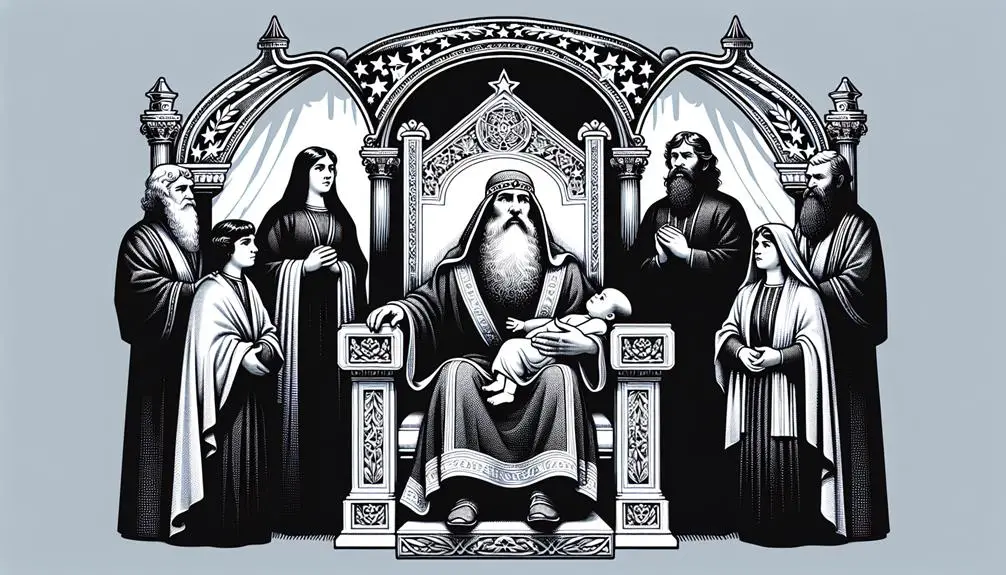
Solomon's renowned wisdom, a gift from God, profoundly influenced his reign over Israel and established him as a figure of unparalleled judgment and knowledge in biblical history. This divine wisdom not only guided him in governing his people but also in monumental endeavors such as the construction of the Temple, a symbol of Israel's faith and dedication to God. Solomon's wisdom, however, wasn't confined to architectural achievements; it extended to diplomacy and international relations, notably with Queen Sheba. Her visit to test Solomon's wisdom with challenging questions is emblematic of his far-reaching reputation for sagacity.
Solomon's response to Queen Sheba's inquiries and the grandeur of the Temple construction are testimonies to his profound understanding and utilization of wisdom in leadership. These narratives highlight the multifaceted application of Solomon's divine gift, from governance and judicial decisions to architectural innovation and international diplomacy. Analyzing Solomon's wisdom offers insight into the holistic approach to leadership, emphasizing the balance between spiritual guidance, knowledge, and the practical aspects of ruling a nation. This comprehensive understanding of wisdom underlines its significance in achieving a prosperous and morally upright society.
Daniel in the Lion's Den
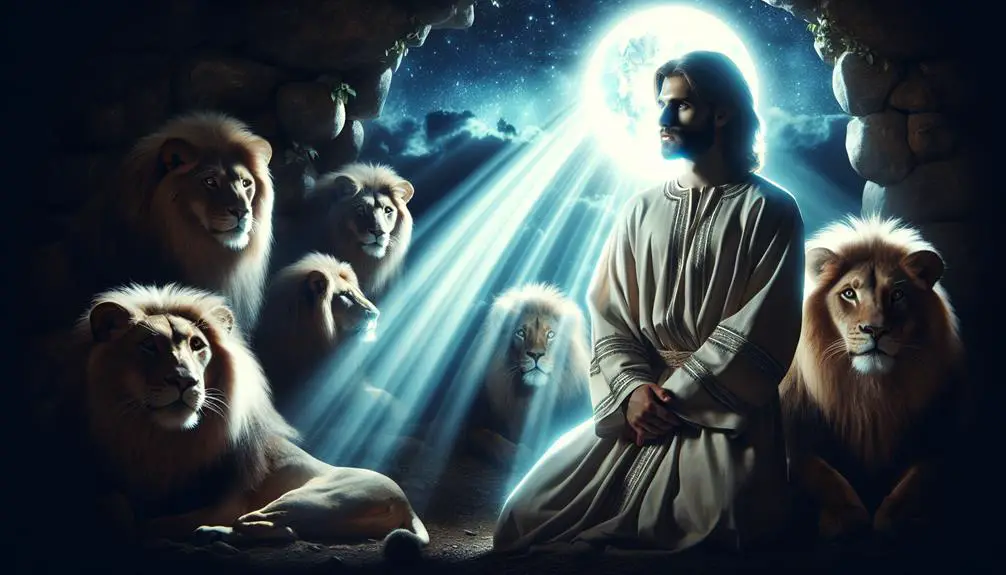
Just as Solomon's wisdom showcases divine intervention in leadership, so too does the story of Daniel in the Lion's Den highlight the theme of unwavering faith amidst seemingly insurmountable trials. You'll find that faith's courage, coupled with divine intervention, plays a pivotal role in navigating and surviving the challenges Daniel faces. This story isn't just a testament to Daniel's steadfast belief but also serves as a beacon for anyone facing their own figurative lions.
To engage deeper with this narrative, consider the following aspects:
- Divine Protection: Daniel's survival wasn't a product of mere luck or his own doing but a clear act of divine intervention, showcasing the might and protection offered by faith.
- Faith's Courage: Despite knowing the consequences, Daniel's unwavering practice of his faith, even in the face of death, underscores the courage faith imbues.
- Political Intrigue: The story is rife with jealousy and manipulation, highlighting how Daniel's integrity sets him apart—and ultimately, leads to his vindication.
- Symbolism: The lions' den represents not only the trials one may face but also the triumph over such trials through faith and divine favor.
Analyzing Daniel in the Lion's Den offers rich insights into the power of faith and the divine's role in human affairs.
The Prodigal Son
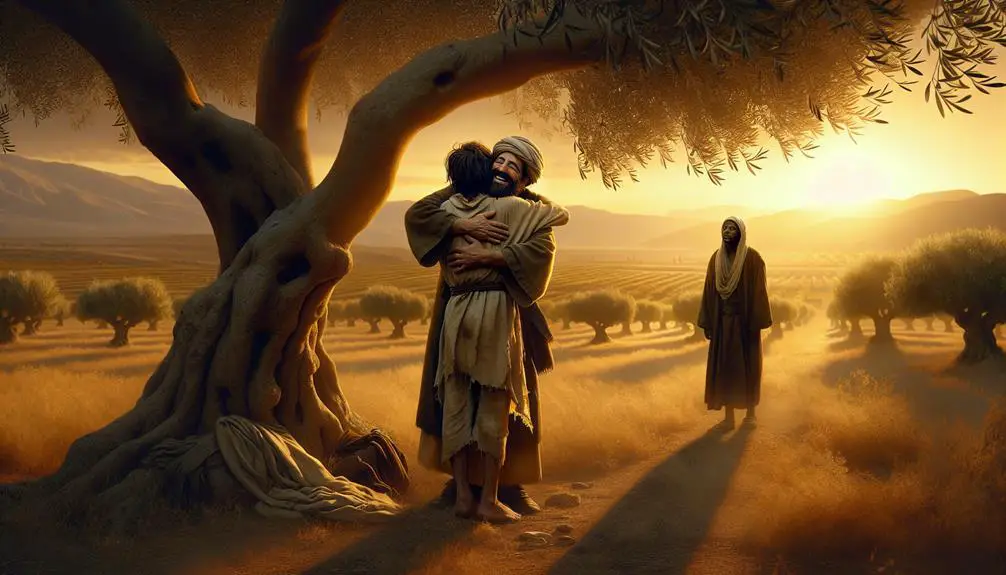
Amid the tapestry of biblical narratives, few stories resonate as profoundly with themes of forgiveness and redemption as that of the Prodigal Son. You witness a tale that unearths deep insights into the human condition, highlighting the reconciliation theme and the journey of regaining lost identity.
Aspect |
The Prodigal Son |
Implications |
|---|---|---|
Rebellion |
Leaving home |
Lost identity |
Desperation |
Famine strikes |
Self-reflection |
Repentance |
Decision to return |
Hope for redemption |
Forgiveness |
Father's embrace |
Unconditional love |
Restoration |
Return to family |
Regained identity |
This narrative serves as a powerful exploration of the complex dynamics within familial relationships and the boundless capacity for forgiveness. It's not just about a young man squandering his inheritance but about his internal transformation from loss to self-discovery. The father's response underscores the reconciliation theme, demonstrating that love and forgiveness can transcend the deepest of rifts. You're invited to ponder the significance of reconciliation, not just as a biblical ideal but as a transformative process in your own life. The story of the Prodigal Son, with its layers of lost identity and redemption, encourages you to reflect on the essence of forgiveness and the possibility of a new beginning.
Frequently Asked Questions
How Have Interpretations of These Favorite Bible Stories Evolved in Contemporary Religious Studies?
In contemporary religious studies, you'll find that interpretations of biblical narratives have evolved significantly. Scholars now apply textual criticism and analyze historical accuracy more rigorously. They're not just accepting these stories at face value; instead, they're delving into the contexts, authorship, and potential biases of the texts.
This analytical, scholarly approach has led to a deeper, more nuanced understanding of these narratives, challenging traditional views and offering fresh perspectives on ancient texts.
In What Ways Have These Bible Stories Been Represented or Referenced in Modern Popular Culture, Such as Movies, Literature, and Art?
You've likely noticed, maybe without realizing, the threads of ancient tales woven into the fabric of today's culture. Cinematic adaptations and musical interpretations breathe new life into these narratives, transforming them into something both familiar and novel.
From blockbuster movies to bestselling novels, and even in evocative paintings, the essence of these stories persists, morphing to fit the contours of contemporary life while preserving their timeless wisdom and intrigue.
What Psychological or Philosophical Analyses Have Been Applied to Characters and Events in These Stories, and What Insights Do They Offer?
Analyzing character motivations and narrative symbolism in stories offers deep insights into human psychology and societal norms. Experts dissect characters' actions, revealing underlying desires and fears that resonate with universal experiences.
Symbolism, woven into the narrative, often mirrors philosophical dilemmas, challenging readers to reflect on morality and existence. This analytical approach not only enriches your understanding of the narratives but also connects timeless themes to contemporary life, sparking profound personal and societal reflections.
Can You Discuss the Impact of These Bible Stories on Interfaith Dialogue and How They Are Viewed or Adapted by Different Religious Traditions Outside of Christianity?
You're delving into how Bible stories influence interfaith dialogue, focusing on their reception and adaptation by non-Christian traditions.
These narratives, through scriptural translations, often serve as bridges in interfaith celebrations, highlighting common moral and ethical values.
Analyzing these adaptations offers deep insights into how religious stories are universal, fostering understanding and respect among diverse faith communities.
It's a scholarly exploration of the stories' impact beyond their original context.
How Do These Stories Influence Ethical and Moral Discussions in the Context of Modern Societal Issues?
You're navigating a world where ethical dilemmas clash with traditional morals, much like ancient stories confront modern societal issues. These narratives serve as a moral compass, guiding discussions on ethics in today's context.
They provoke thought, challenge societal norms, and inspire a reevaluation of what's considered morally acceptable. Analyzing them, you delve into how ancient wisdom can shape and influence contemporary ethical debates, offering insights that transcend time and cultural boundaries.
Conclusion
In analyzing these biblical narratives, it's evident that they not only encapsulate moral and spiritual lessons but also mirror the complexity of human nature and divine interaction.
Each story, from the creation of the world to the redemption of the Prodigal Son, serves as a microcosm of larger existential dilemmas and triumphs.
In essence, they're not just tales from the past; they're a compass for life, guiding us through thick and thin. These stories remain indispensable, shedding light on the perennial quest for meaning and morality.



Sign up